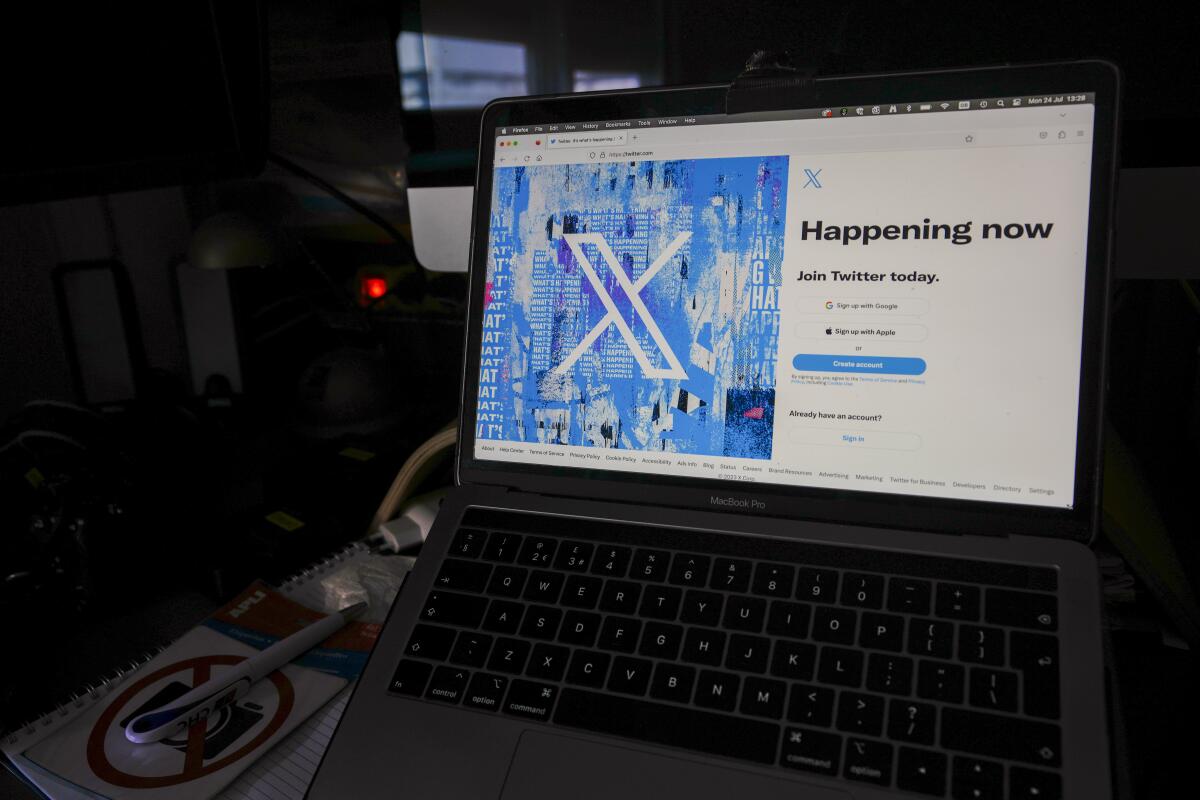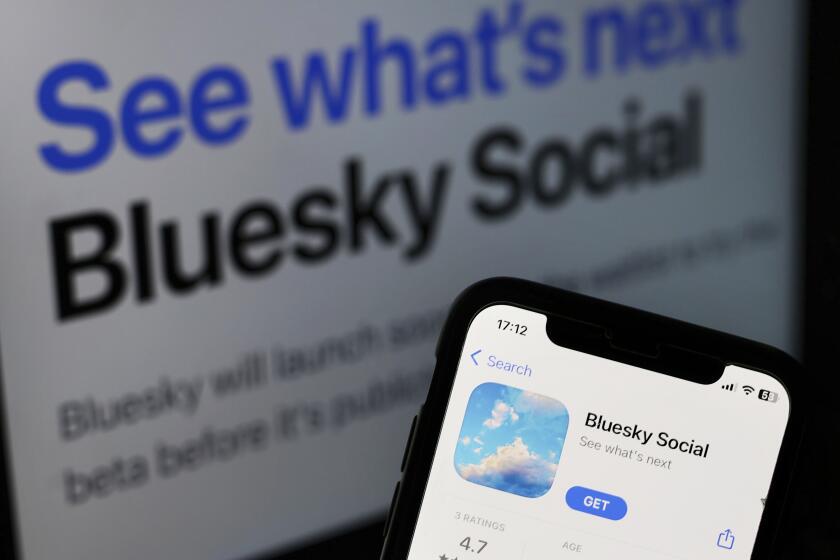Column: A few sick days made it clear — Twitter is dying, and so is social media as we know it

A nasty summer cold knocked me out recently for a couple of days. I cranked up the fan and the bad TV, as one does, and zoned out. When I came to, and it was time to get my bearings and get back to work, the first order of business was the same as it ever was: log onto social media.
When I did, I instantly sensed that something was off. Seriously off.
So much so that I couldn’t help but finally, grudgingly agree with the critics who’ve been warning that we are witnessing the end of days for the social media network as we knew it.
On Twitter — excuse me, X — there seemed to be as many ads for Cheech and Chong’s cannabis products as posts from people I actually recognized. When I wrote a post, a reply instantly materialized from a bot trying to interest me in a video about how to make money off crypto. It felt like logging directly into a late-night infomercial.
The alternatives weren’t much better — Threads, Meta’s competing product, launched by Mark Zuckerberg to much fanfare just weeks ago, felt vaguely cheery but ultimately vacant. I saw a handful of posts from the same few users and some promotional content from people I must have followed at some point on Instagram, but whose poolside lives looked altogether alien to me now. It was like being in a well-designed but eerily empty mall, a digital “Dawn of the Dead” with more photogenic zombies.
There’s a paradox at the heart of Facebook, Twitter, Reddit and other companies that rely on user-generated content — and it’s leading to their downfall.
I quickly logged off, and it turns out I’m not alone — Threads’ user count has plunged by 82% since its launch less than a month ago. After its meteoric (and overhyped) rise to 100 million users in mere days, Threads has been in a steady nosedive. As of Aug. 1, users were spending just 2.9 minutes a day there, according to one count.
For over a decade, logging onto social media, especially Twitter, has been among the first steps of the day for countless professionals, students and the very online — a way to instantaneously reenter the fray and get up to date on the latest news, trends and memes. Over the years, despite the chaos that tumbled down its feed, it became an orienting force, a way that we parsed and organized information for the coming day or week.
That force is, for all intents and purposes, extinguished. I’m not alone in thinking so either — a journalism intern at Bloomberg wrote about how their peers don’t take X seriously and seemed surprised at older colleagues who still do. Resolving to delete the app, the intern remarked that the algorithm seems to downrank news and favor reactionary politics — and it’s hard to argue with that.
But old habits die hard. I’ve been logging onto Twitter at the start of every working day since, oh, 2011; it’s easy to let muscle memory take over and keep refreshing the feed regardless of what’s befallen the place. That’s why taking a break and logging back on is such a stark wake-up call — and I used the occasion to embark on a casual investigation of the state of social media, a year into its supposed death.
So, I headed over to the once-buzzy Bluesky, which seemed to face the opposite issue that Threads did. The place seemed noisy and vibrant, but also all but impenetrable to a lay-user showing up occasionally and without much of a community — it’s the place where Twitter power users and online activists have felt most at home, and that’s great, but I kind of stared blankly for a few minutes, and after no new posts loaded for a minute or two, gave up the ghost.
The bizarre renaming of Twitter is the latest and most pointed example of how Silicon Valley is losing touch with reality.
See, if Threads was a rocket with few actual riders that couldn’t sustain its velocity, Bluesky is like a party on an overstuffed hot air balloon whose engineers are frantically building more decks mid-flight. It apparently recently passed 1 million users, but its invite-only system means that growth is slow.
On the one hand, that sluggish, deliberate pace of growth can be a good thing, giving the site’s staff ample time to build robust policies and user support — assuming they do in fact do those things. (And there’s still plenty of demand for those invites; whenever I mention having one, I immediately get hounded for it.) On the other, many users may lose interest — and Bluesky may lose its window to supplant the competition.
Finally, I turned to Mastodon, the first of the true-blue Twitter competitors to arise after Musk took the reins and broke out the wrecking ball last year. It’s my favorite of the alternatives, by a wide margin, but it’s also … quiet. Nice and quiet, but quiet nonetheless.
The most pervasive knocks on Mastodon are that it’s confusing for users at first and that it’s relatively hard to find the people you want to follow. I think the first complaint is overstated, while the second rings truer.
I mostly wound up following academics and progressive tech folks on Mastodon. To me, it has the vibe of a great cocktail party after an academic conference: fascinating people, stimulating if polite discussions, and a sense — one you know is dumb and juvenile but still can’t shake — that you’re missing a rager somewhere else.
People who spent way too much time online are suddenly obsessed with Bluesky, a social media app that looks and feels like early Twitter.
The empty mall, the airship kegger, the erudite cocktail hour — in theory, you can attend them all. In reality, who has the time?
Twitter has already been eulogized to death, but what was great about it was that it could be all of those things at once. (Bear in mind that we’re talking about the end of one kind of social network — the live-wire feed stuffed with news and commentary, versus the family-and-friends approach of Facebook, which lumbers on, nearly 3 billion users strong.)
It may well come to be that the last 10 years of this kind of centralized digital life will be seen as an aberration, and visiting a more diversified suite of communities, platforms and websites will revert to being the norm, as it was in the 1990s and ‘00s. The science fiction writer Cory Doctorow has argued that this is not only likely but necessary — that the accumulated weight of years of bad policy decisions and the platforms’ evolution into overstuffed monopolies leaves little alternative but to let them burn, as we would a wildfire that may appear cataclysmic but is in fact needed to clear out the forest floor.
Ideally, out of the wreckage, we’ll find our online people once again, under better circumstances and conditions — and if we’re smart, we’ll push for more democratic and responsive platforms in the process.
Or we won’t! And we’ll be freed from a pair of long-standing proclivities — posting and doomscrolling — that could feel as burdensome as they were broadening.
There’s a paradox at the heart of Facebook, Twitter, Reddit and other companies that rely on user-generated content — and it’s leading to their downfall.
So that’s the state of the social media feed in 2023: fractured and fragmented, siloed and confused. No longer the place where cultural trends become clear, where news breaks or narratives form, but something smaller and messier.
And as we prep for the end times, we should keep in mind that what’s unusual isn’t that Twitter has died — this one thrumming central location where celebrities, politicians, journalists, weird posters and activists all converged — it’s that it ever managed to exist at all.










